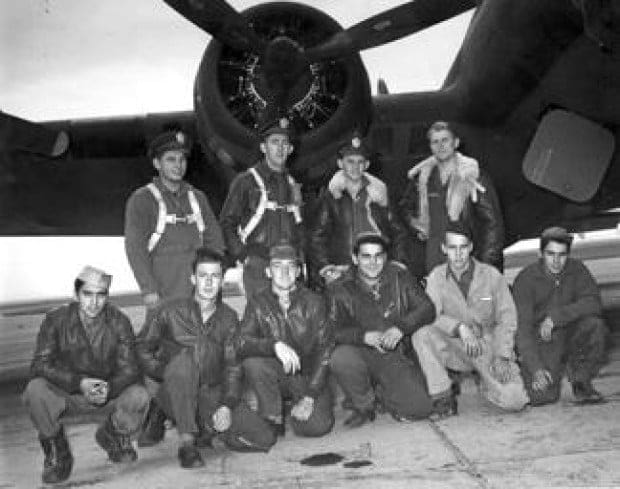
Eighty-five-year-old Darrel D. Wilson was a prisoner of war for more than a year. He came out of the ordeal alive, married and raised three children, one who lives in Malibu.
By Jonathan Friedman / Assistant Editor
Lt. Darrel D. Wilson was crossing the English Channel aboard a B-17 aircraft on April 10, 1944. It was his 23rd mission. He was closing in on his 25th assignment, which upon completion a soldier was allowed to go home.
“This was supposed to be an easy mission to Belgium, and we’d be back [in England] in two hours,” said Wilson, now 85 and living in the Wadsworth VA Hospital in Westwood.
But the supposed easy assignment soon turned into anything but that. The B-17 was hit by anti-aircraft fire not long after taking off from England. The controls of the plane were damaged, and all the aircraft could do was go in circles.
When asked about his feelings during the ordeal, Wilson replied, “I was hoping to save my ass.”
But it was not just himself that the Orange County native was looking out for. After the plane went down, Wilson, with shrapnel wounds in his back, held on to two friends in the cold water as they waited for help to arrive. One friend died, and Wilson had to let him go.
Allied help did not come to the stranded soldiers because the Germans arrived first, and collected the survivors. Wilson spent the next year at Stalag I, a Prisoner of War camp in Barth, Germany, about 100 miles north of Berlin.
“The conditions were pretty poor,” Wilson said.
The prisoners at the camp received a daily ration of two potatoes and two slices of bread. There was an initial beer allotment, but that ended when the Allies bombed the local brewery. In the final months, there was sometimes no food at all, and the prisoners were forced to eat cockroaches. Wilson entered the camp at 185 pounds, and when it was liberated by the Soviets a year later, he was 95 pounds.
“We were hungry all the time,” Wilson said.
The prisoners spent their day playing bridge and poker to pass the time. Conversation was another distraction.
“People would talk about how good they were during the war,” Wilson said. “There was a lot of showing off.”
Wilson had two brothers in the service, and his sister was a Navy nurse. One of his brothers was supposed to meet Wilson after he returned from the ill-fated flight. When it became clear Wilson wasn’t coming back, the brother alerted their mother that Wilson had been captured.
Wilson was able to keep in touch with his parents and future wife, Winifred, somewhat. Letters could be sent to and from the camp, but they were heavily censored. The Germans would cut out anything negative. And it was not guaranteed the letters would be received.
“I was just a young person at the time,” said Winifred Wilson, who still lives in Orange County. “It was frustrating.”
She said she received two letters from Wilson during his time in the camp, although he had actually written more than that.
The men in the camp kept abreast of the war situation by getting information from new prisoners.
“We knew far more about what was going on in the war than the ones that were stationed in England,” Wilson said.
The Soviets liberated the camp on April 25, 1945. Wilson, an American with access to cigarettes, and a Russian friend, who had vodka, then set out across Germany and into Belgium, toward England.
Wilson returned to the United States later that year, and was soon married. He and Winifred had a daughter, Lee, the next year. Lee O’Keefe-Hardy is an artist living in Malibu. She said her father’s experience influenced his parenting of her and her two younger brothers.
“He told us that we better appreciate what we have, because ‘I know what it’s like to be without,'” O’Keefe-Hardy said. “He told us, ‘Eat your whole dinner because I know what it’s like to be cold and hungry.'”
O’Keefe-Hardy said she appreciated those lessons, as well as her father’s hard work ethic. Upon returning to this country, he had several jobs, and attended USC. He eventually earned a teaching degree, and went on to a lengthy career as a teacher in Orange County. Wilson and his family also lived briefly in Hawaii during the 1950s, at which time he went back and forth to Korea to fly missions in the war there.
Wilson and his wife have three grown children, five grandchildren and four great-grandchildren.
